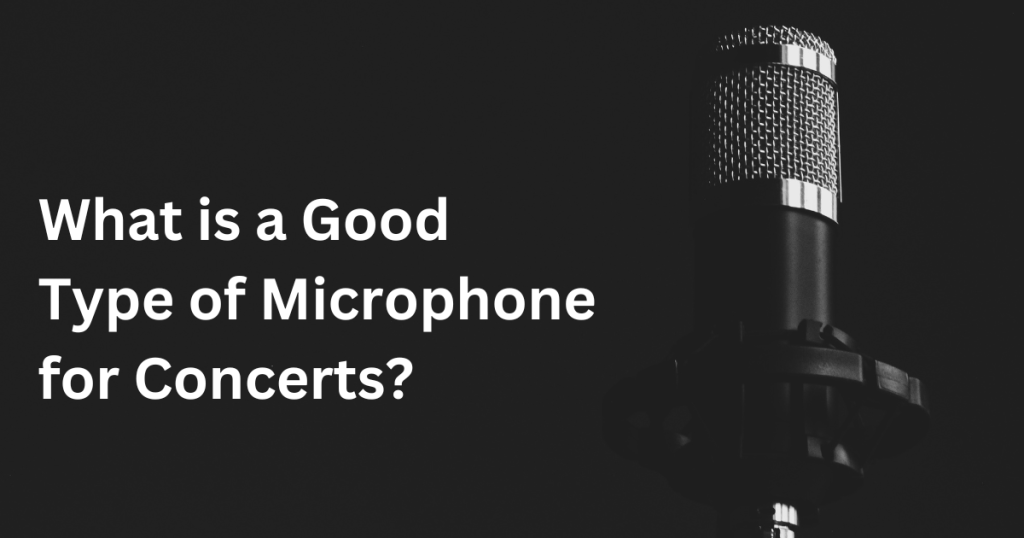
When it comes to concerts, the microphone is one of the most critical tools for ensuring the audience hears a performance in all its glory. Whether you’re a singer belting out ballads, a band amplifying instruments, or a sound engineer setting up the stage, choosing the right microphone can make or break the show. With so many options available, how do you find the one that fits your needs? Let’s dive into the world of concert microphones and explore what makes them great.
Types of Microphones for Concerts
Dynamic Microphones
Dynamic microphones are a top choice for concerts due to their rugged design and ability to handle high sound pressure levels (SPL). These mics are less sensitive to ambient noise, making them ideal for loud environments like live music venues. Their cardioid polar patterns help isolate the performer’s voice or instrument while rejecting background noise.
- Example: The Shure SM58 is an industry favorite for vocals, renowned for its durability and excellent sound quality.
Condenser Microphones
Condenser microphones are known for their sensitivity and ability to capture subtle nuances. While typically used in studio settings, they are occasionally employed in concerts for delicate instruments like acoustic guitars or for vocalists seeking pristine clarity. However, they require careful handling and often need phantom power to operate.
- Example: The Neumann KMS 105 is a premium condenser mic tailored for live performances.
Ribbon Microphones
Ribbon microphones, though less common, are sometimes used in live settings for their warm and natural sound reproduction. They are delicate and better suited for controlled environments, but some modern models are robust enough for concerts.
- Example: Royer R-121 is a popular choice for amplifying guitar cabinets.
Key Features to Consider for Concert Microphones
Durability
Concert microphones must withstand rough handling, falls, and extreme stage conditions. Dynamic microphones often excel in this area due to their sturdy construction.
Sound Isolation
With loud instruments and cheering crowds, sound isolation is critical. Look for microphones with a tight polar pattern to focus on the intended sound source.
Feedback Resistance
Feedback can ruin a performance, so choosing a mic with good off-axis rejection is essential. Dynamic microphones with cardioid or supercardioid polar patterns are particularly effective at minimizing feedback.
Popular Microphone Models for Concerts
Shure SM58
This legendary dynamic microphone is celebrated for its reliability, affordability, and ability to deliver consistent sound quality. It’s perfect for vocalists across all genres.
Sennheiser e935
The Sennheiser e935 offers crystal-clear vocals with excellent feedback rejection, making it a favorite among professionals.
Audio-Technica AE6100
Known for its aggressive sound rejection and rugged design, this mic is a great option for live vocals.
Neumann KMS 105
For those seeking a high-end microphone, the Neumann KMS 105 delivers unparalleled clarity and detail, especially for vocal performances.
Microphone Accessories for Concerts
Windshields and Pop Filters
These accessories reduce plosive sounds and protect the microphone from moisture, extending its lifespan.
Stands and Mounts
Proper placement ensures optimal sound capture and minimizes the risk of damage during performances.
Wireless Microphone Systems
For performers who need freedom to move around, wireless microphones are a game-changer. They offer mobility without sacrificing sound quality, though they can be more expensive.
Choosing the Right Microphone for Specific Needs
Vocal Performances
Dynamic microphones like the Shure SM58 or Sennheiser e935 are perfect for lead singers and backup vocals, offering clarity and reliability.
Instrument Amplification
For amplifying drums, guitars, or keyboards, specialized microphones such as the Shure Beta 52A for kick drums or the AKG C414 for acoustic instruments can enhance the sound.
Budget Considerations
While premium microphones like the Neumann KMS 105 provide exceptional sound quality, budget-friendly options like the Shure SM58 deliver professional-grade performance without breaking the bank. Determine your needs and balance cost with quality for the best results.
Maintenance and Care of Concert Microphones
To ensure your microphones last through countless performances, regular maintenance is essential. Clean the grille and body with a damp cloth, store them in protective cases, and avoid exposing them to extreme temperatures or moisture.
Final Thoughts
Selecting the right microphone for a concert is a mix of understanding your specific needs, budget, and desired sound quality. Dynamic microphones are often the go-to choice for their durability and performance in live settings, while condenser and ribbon microphones cater to specific needs. Armed with the right mic, you’re ready to take the stage and give your audience an unforgettable experience.
FAQs
- What is the best microphone for live vocals?
The Shure SM58 is widely considered the best for live vocals due to its durability, affordability, and excellent sound quality. - How do you avoid microphone feedback in concerts?
Use microphones with cardioid or supercardioid polar patterns, position speakers away from the microphone, and manage gain levels effectively. - Are wireless microphones better for concerts?
Wireless microphones are great for performer mobility but can be more expensive and require proper frequency management to avoid interference. - Can condenser microphones be used for live performances?
Yes, but they require careful handling and are best suited for quieter settings or instruments requiring high sensitivity. - What’s the difference between dynamic and condenser microphones?
Dynamic mics are durable and handle high SPL well, ideal for concerts. Condenser mics are more sensitive and suited for capturing subtle details, often in studio settings.
